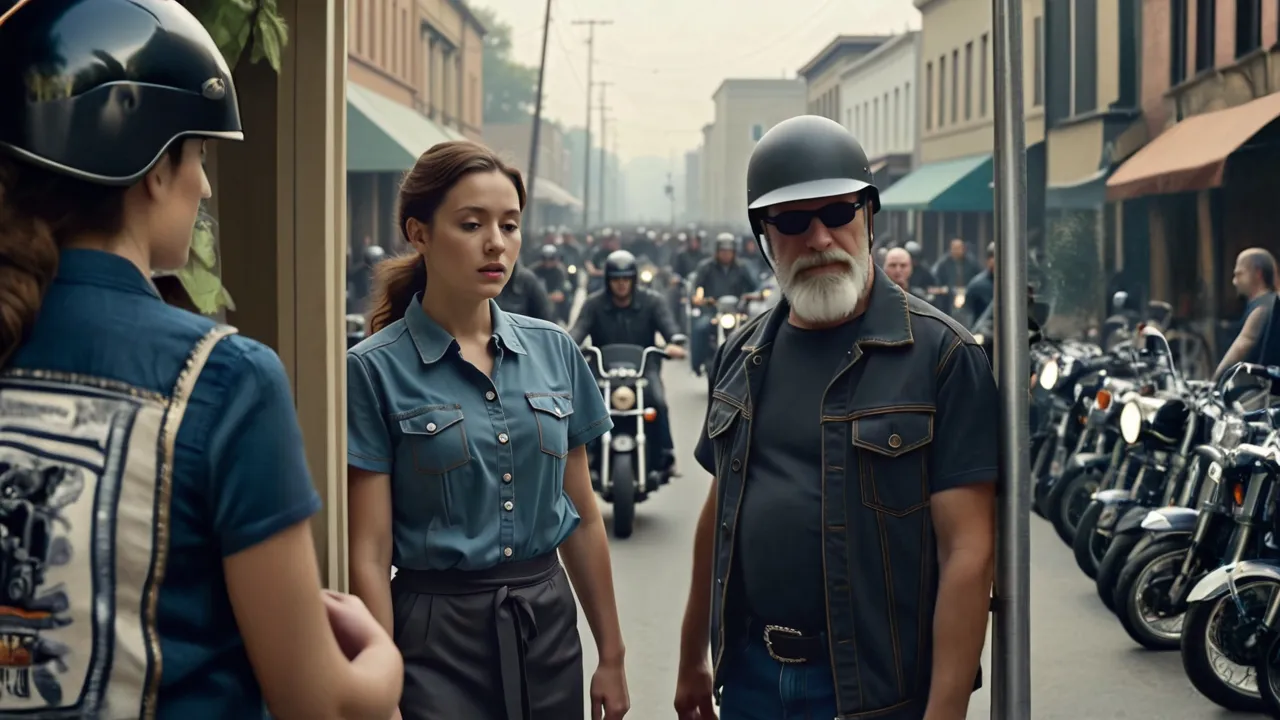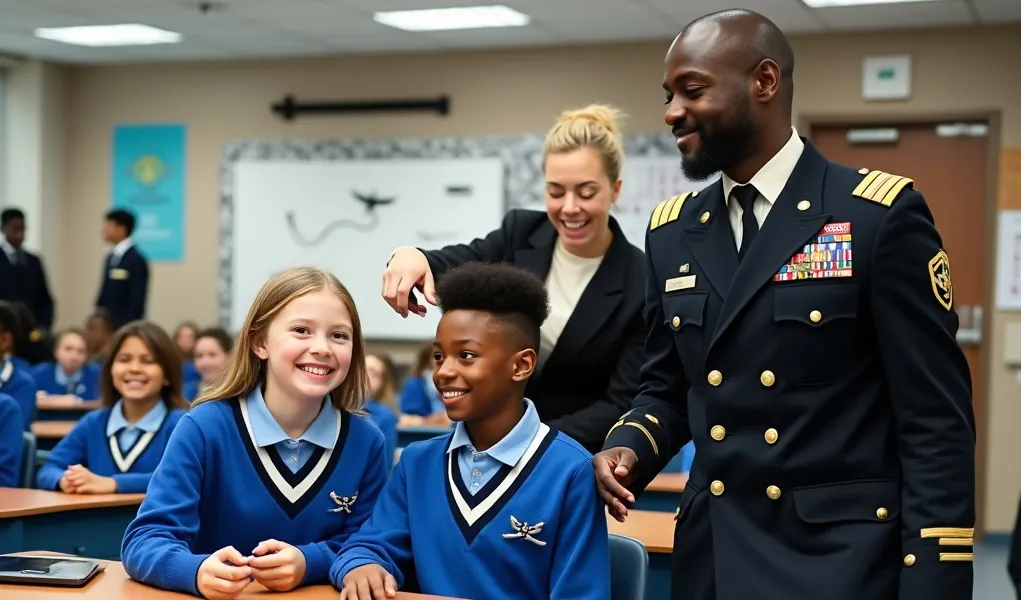You’re not from around here, are you? She asked. I used to be. A long time ago.
Well, she said, welcome back. I didn’t know if I was back. I wasn’t even sure I belonged anywhere.
But the words felt warm. I asked her where to find housing listings. She pointed to a corkboard by the door.
I scanned the notes. Dog walking. Used bike for sale.
Music lessons. Room for rent. That one caught my eye.
For quiet lady. Private room, shared kitchen. House safe.
Near bus. No nonsense, no drama. Four hundred month? Call Joyce.
It was written in blocky, no-nonsense handwriting, like someone who meant what she said. I took a photo of the number. By noon, I’d walked two more blocks and found a parked bench in the sun.
I called. The voice that answered was raspy, skeptical. Yes? I’m calling about the room for rent, I said.
Long pause. How old are you? Seventy-seven. Are you clean? Yes.
No boyfriends, right? I chuckled. Not in a long time. Well, she said, come by at four.
2185 East Stafford. Bring cash for the first week. Then she hung up.
I wrote the address on a napkin. By four, I stood in front of a faded blue house with a peeling porch and a wind chime that sounded like someone tapping spoons together. Joyce opened the door with a cigarette in one hand and a cat curled around her ankles.
You’re the old lady? She asked. I suppose I am. She stepped aside.
Come in, then. Let’s see if we can tolerate each other. Joyce’s house smelled like lavender and fried onions.
Not unpleasant. Just lived in, like a woman who cooked real meals and didn’t fuss over the occasional grease stain. She led me through a narrow hallway stacked with books and magazines into a small sitting room where the television was on mute.
A crocheted blanket lay folded on the arm of the sofa. The room’s upstairs, she said, gesturing with her cigarette. I followed her up the creaky stairs, one hand on the banister.
The hallway at the top was darker, the paint slightly chipped. She opened the door to a room at the end. This is it.
It was small. A twin bed. A nightstand.
A dresser that had seen better decades. But the window was wide, and the afternoon sun poured in like it knew something good had finally found me. There was even a little desk with a worn chair.
It’s fine, I said. How much again? Four hundred a month, but I take weekly. Hundred a week.
Cash, no checks, no credit, no sob stories. She looked me over. You don’t seem like the sob story type.
No, I said. Not anymore. She nodded, like that was the right answer.
Kitchens shared. Bathrooms down the hall. No guests without warning.
I like quiet. You cause trouble. You’re out.
We clear. Crystal. She handed me a key.
You can stay tonight if you’ve got the first week’s rent. I handed her five twenties from the envelope I’d tucked into my inner coat pocket. She folded the bills without counting.
You hungry? I could eat. Joyce made grilled cheese sandwiches and poured tomato soup from a saucepan. We ate at the small kitchen table under a yellowed ceiling fan.
She didn’t ask questions, which was a relief. People always ask too soon before you’re ready to say it out loud. She only said, I hate eating alone, and I understood that well enough.
After dinner, I unpacked in the small room. I’d only brought three changes of clothes, a toothbrush, my medications, and an old paperback novel I never finished. I laid everything out carefully in the dresser, folding each item like it mattered.
Maybe it did. That night, I lay in the narrow bed listening to the sounds of a house not mine. The ticking of a wall clock, the groan of floorboards, the distant sound of Joyce talking softly to the cat.
No one called. No one texted. I didn’t turn the phone on.
In the morning, I made coffee before Joyce was up. The kitchen felt more familiar than my own back home. Maybe because it didn’t belong to people who only remembered me when they needed something.
By the third day, I started walking the neighborhood. Two blocks down, there was a small corner cafe with a chalkboard sign out front. Help wanted.
Morning shift. Apply inside. I stood there for a moment.
I hadn’t worked in 15 years, but I was no stranger to early hours in coffee pots. Inside, the place was simple. Three booths, a counter, a few bar stools with cracked red cushions.
A young woman in an apron was wiping the counter. You hiring? I asked. She looked up, surprised.
You want to apply? Yes. She called to the back. A stocky woman with her hair in a messy bun emerged.
Her name tag read Heather. You have experience? She asked. I’ve raised three kids and run a household for 50 years.
I can make coffee, carry plates, and I don’t call in sick. She stared at me for a beat, then shrugged. Trial shift tomorrow, 6 to 11.
You make it through that. We’ll talk. That night, I ironed the only blouse I had that still held a crease.
I went to bed early and stared at the ceiling for a long time. It had been less than a week since the airport, less than a week since I’d been left behind like forgotten luggage, but something had shifted. I wasn’t waiting anymore.
Now I was walking, working, beginning. No one needed to know. Not yet.
This life, this quiet, new, unexpected life, was mine. The cafe smelled like burnt toast and old hope. I arrived at 5.45, 15 minutes early.
The front door was still locked. A man with thick glasses and a flower-stained apron opened it for me without a word. He grunted something that might have been, good morning, and returned to the kitchen.
Heather arrived ten minutes later, holding a travel mug and a set of keys on a rainbow lanyard. She unlocked the register and handed me an apron without ceremony. Keep your hair tied back, no perfume, refill cups without waiting to be asked, and if someone leaves less than a dollar tip, that’s on you, not them.
I nodded. She looked at me for a moment, then softened just a little. You nervous? No, I said.
I’m seventy-seven. I’ve buried a husband, raised a son who forgot my birthday three years in a row, and survived five colonoscopies. This is just coffee.
Heather snorted. Fair enough. By seven, the first wave of regulars came in.
Contractors, early risers, nurses fresh off the night shift. I moved slow but steady. I remembered orders, poured coffee with a steady hand, smiled without overdoing it.
By nine, I found a rhythm. Where’d they dig you up? one of the men asked, smiling kindly. Same place they find everything worth keeping, I said.
The back shelf, under a blanket. He laughed and left a five-dollar tip. Heather watched.
She didn’t say much, just nodded once after the breakfast rush died down and handed me a clean towel to wipe down the counters. We finished at eleven. She poured herself another cup of coffee, then pointed to the stool next to her at the counter.













